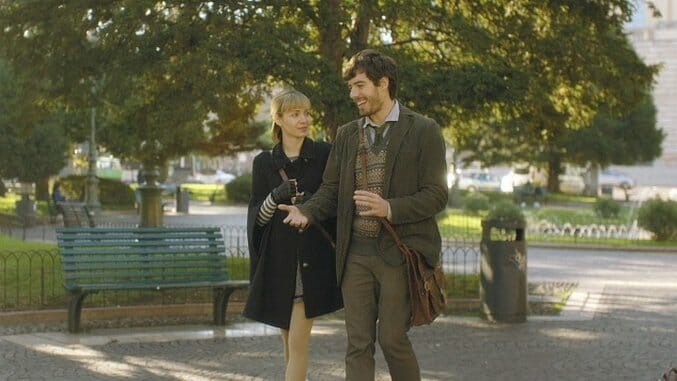In Search of Fellini

Your appreciation of Taron Lexton’s In Search of Fellini will correlate directly to your appreciation of its winsome lead, Lucy (Ksenia Solo). Lucy is a small town girl from Ohio who, having spent her life living in a protective bubble shaped by mother Claire (Maria Bello) to protect her from the vagaries of being human, decides to make for Italy to meet Federico Fellini, the maestro himself. She is enchanted by his films, as anyone would be, after watching them all during a Fellini film festival, and having been raised on dreams and whimsy, she cannot resist the allure of his magic.
After spending just a few minutes in Lucy’s company, you’ll realize: She’s agonizingly naive. But Lucy’s childlike manner is almost in keeping with Fellini’s pre-’60s work, populated by female leads possessed of varying degrees of innocence. In so many ways, she’s the perfect Fellini female lead, a true believer in the sort of magic that runs like a current through his filmography. (It doesn’t hurt, either, that she’s a spiritual dead ringer for Giulietta Masina, Fellini’s favorite leading lady, not only in his cinema but in his life: They married in 1943, and stayed together until his death in 1993 in spite of his affairs and his functional ineptitude concerning all things unrelated to filmmaking.)
Lucy’s naivete and her love for Fellini matches Lexton’s own passion for Italy’s most revered director. Her innocence isn’t exactly catching (though it is disarming, at least after the film’s first half hour), but his adoration is infectious. If you aren’t a big Felliniphile, Lexton might make you into a devotee, and if you are, then In Search of Fellini’s frayed edges won’t matter much to you—if they matter at all. You might even recognize a little bit of yourself in his work, regardless of your fondness for Fellini: Lucy, raised by a helicopter parent and watched over by a helicopter aunt, Kerri (Mary Lynn Rajskub), feels like a millennial stereotype, inoculated against the world by an over-concerned guardian, unprepared for going out on her own and surviving, except that when she takes the chance to fly, she manages. (Catching a plane to Italy takes a bit of gumption, especially if you can’t go an hour in Cleveland without getting your Vespa towed.)
-

-

-

-

-

-

-

-

-

-

-

-

-

-

-

-

-

-

-

-

-

-

-

-

-

-

-

-

-

-

-

-

-

-

-

-

-

-

-

-








































